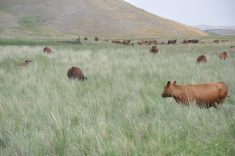Western Producer staff
Cattle industry politicians of yesteryear could not have imagined, in their wildest dreams, a summer like the summer of 1995. It would have seemed like pie-in-the-sky dreaming.
Consider the core cowboy political demands since the Canadian Cattlemen’s Association became politicized in the 1970s:
- For the better part of two decades, cattle sector politicians have dreamed of, and campaigned for, an end to the Crow transportation subsidy and its offspring.
Done in the summer of ’95.
- For the better part of two decades, Cattlemen leaders have dreamed of, and campaigned for, liberalized trade.
Read Also

Late season rainfall creates concern about Prairie crop quality
Praying for rain is being replaced with the hope that rain can stop for harvest. Rainfall in July and early August has been much greater than normal.
Done, in the summer of ’95 through North American and world trade deals.
- For more than a decade, the Cattlemen have dreamed of a limit on imports of off-shore beef that is in line with American controls – a North American meat import policy.
Done, in the summer of ’95 in the wake of the General Agreement on Tariffs and Trade.
In theory, based on the industry’s political goals over the years, these should be the best of times.
Yet they are not. In fact, 1995 is shaping up to be one of the worst years in recent times for cattle producers and feedlot owners, following a bad 1994.
The recent CCA annual convention was a catalogue of woes.
Cattle prices are falling, feed costs are soaring, the value of the Canadian dollar is rising enough to undercut the value of exports, the government continues to allow in more off-shore beef than the CCA believes is justified and even the Americans are threatening retaliation over increased volumes of Canadian product crossing the border.
To rub salt in the wounds, an Australian official stood at the podium and chided the CCA for being protectionist when it comes to non-North American beef, despite their free-trade rhetoric.
What has gone wrong?
How could the year in which their major political goals were achieved turn out so wrong?
In part, it is a cautionary example for any farmer who puts his faith in a particular political solution.
Market or other political forces can overtake the importance of long-sought solutions.
An example is the declining Ontario tobacco industry.
A few years ago, tobacco farmers won the right to organize supply management as an answer to their industry’s plight. It took years of effort and in the end, meant nothing at all.
It has never happened.
Now cattle producers, who dreamed of the end of the Crow so their feed prices would drop, find market reaction to perceptions of shortages much more potent in raising prices than the impact of the loss of the Crow.
Currency appreciation, over which they have no control, can mean as much as the cattle producers’ fondest political dream.
Protectionism exits with or without free-trade deals.
In the real world, political panaceas usually prove to be false friends who betray you in the end.
















